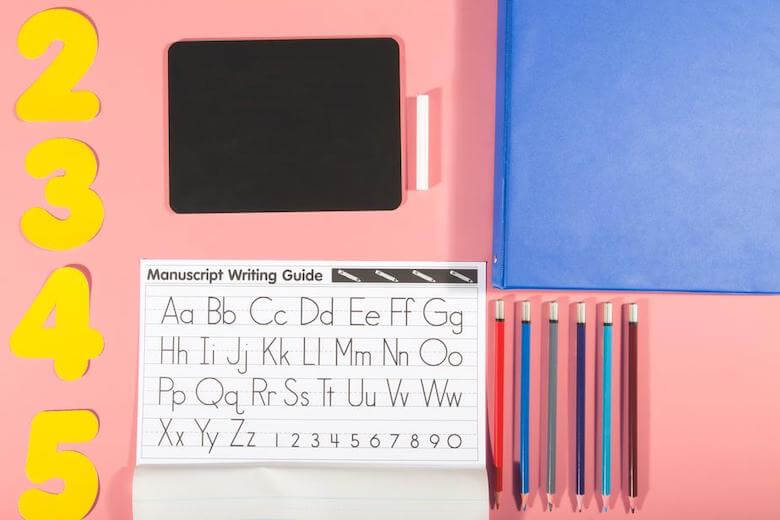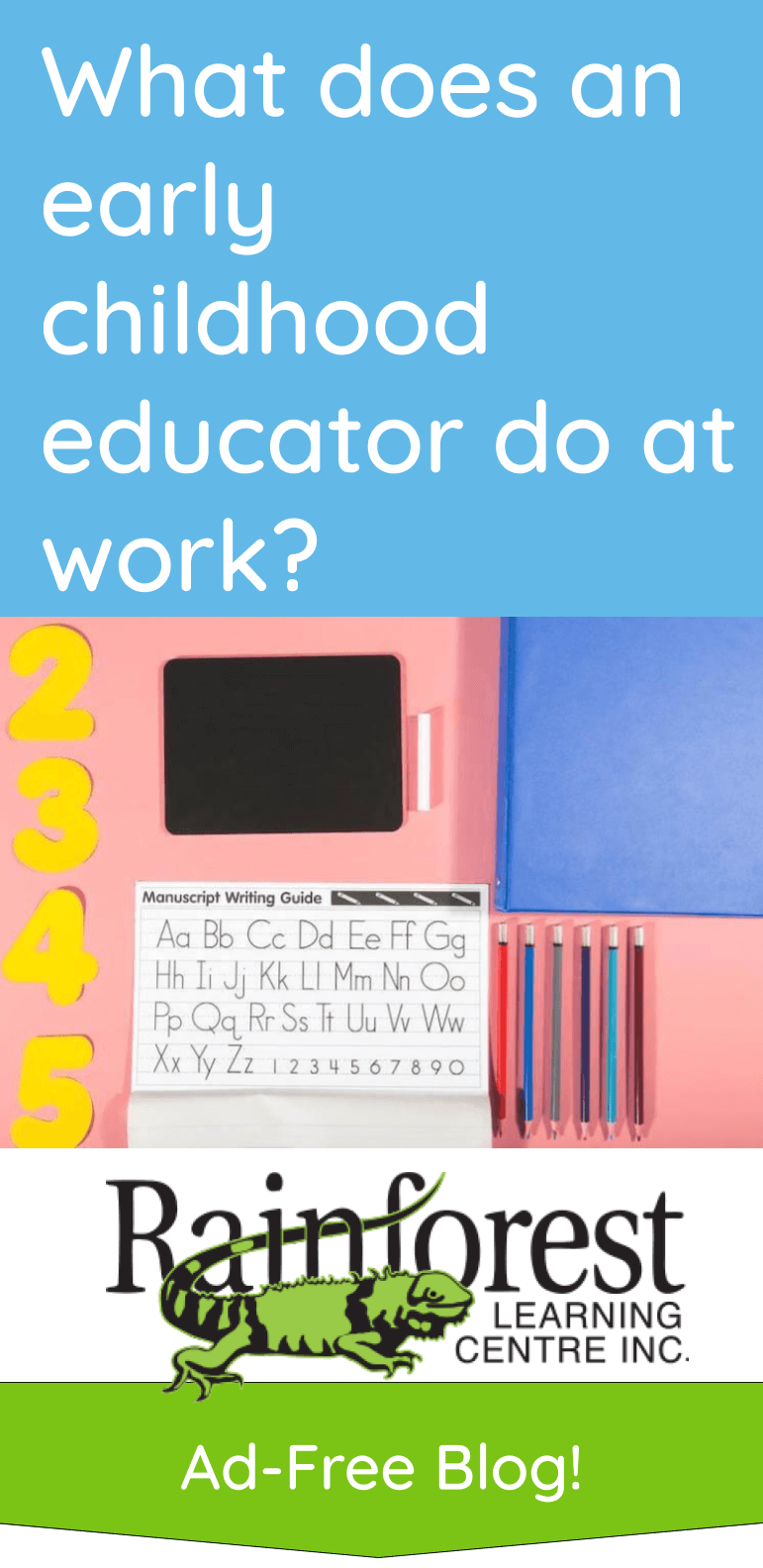
An early childhood educator is an accredited profession in B.C. That means that a person who works in childcare or as a preschool teacher must be certified, and approved by the government to do so. There aren’t a lot of professions that come with so much oversight. So, it would be far from the truth to believe that a daycare provider is ‘just’ watching kids. In fact, early childhood educators receive several hours of education, and must have practical, hands-on experience to be allowed to work in a group child care centre. They do so much more than act as ‘babysitters’ – they impact the crucial, early years of a child’s life.
So, what does an early childhood educator do at work? Below we’ll give some examples.
Early childhood educators provide a safe atmosphere for children – physically, emotionally and mentally
The subtitle above encompasses a lot. Early childhood educators have a big job. They must be aware of everything happening in a classroom full of preschoolers, plus everything that could happen.
The safety requirements involved in running a daycare centre are more than just about physical care. Of course, that’s a huge component of it. Everything from playground safety, food safety, allergy avoidance and earthquake preparedness is part of physical safety.
But there is also emotional and mental safety. Preschool teachers consider things like: Is anyone feeling left out? Are there bullies in the classroom? Could there be an unidentified learning difficulty preventing a child from developing normally, alongside their peers?
Staff meets to think of solutions to these problems. That may be finding ways to create inclusive activities, modifying the schedule to accommodate some children, or even having to give one-on-one attention to a so-called ‘trouble-maker,’ or special needs child.
See related on our blog:
- 3 Key tips to understand and solve temper tantrums in toddlers and young children
- 3 ways early childhood educators can help kids get along and feel included
- 4 Essential circle time ideas for preschools and daycares
Early childhood educators teach children more than facts; they help children develop social, emotional and physical skills too
It may look like meaningless play, but the activities that take place in a daycare centre or preschool have purpose. They are meant to develop a part of a child that may need more skill and learning, to function fully.
For example, learning to work in a team. Learning to make eye contact and form friendships. Learning to balance their bodies on a beam. Learning to label their emotions with new vocabulary.
See related on our blog:
- What is normal gross motor development in early childhood, and why is it important?
- What is social competence in the early years?
- 3 ways to build self-awareness in early childhood
- 3 ways to build confidence in young children
These things take practice. But, they are necessary because they help humans form healthy relationships and live independently later in life. While they come as ‘second nature’ to older children, or adults, they are not small at all. These are the building blocks that lead to further developments as children get older.
On top of that, there are the actual, educational components to the job. That means, coming up with a curriculum to teach preschoolers their letters, phonics, words and numbers. Or teaching them about science subjects, like shadows. And, making sure they get enough outdoor play, experiential education and sensory activities during the day.
See related on our blog:
- How to encourage problem-solving skills in toddlers and young children
- How to find and use teachable moments as an early childhood educator
- What is cognitive development in early childhood?
- Community service learning ideas for early childhood education and daycare
- How to maintain attention span in young children: what we learn from daycare
Preschool teachers also plan field trips and organize environmental learning activities (like recycling drives). They bring in guest speakers (like amputees on Terry Fox day). They plan events for parents and families. The list goes on…
See related on our blog:
Early childhood educators keep track of individual pupils, to meet their specific needs
Preschool teachers also keep logs of the children under their care. Like any teaching job, this is an integral part of helping pupils advance. By looking at children as individuals, an early childhood educator can see where they started, where they are at, and how far they need to go. That applies academically, socially, mentally and emotionally too.
Without these individual logs based on each child, a classroom would be too general. It would assume that all children are the same (which they are not). It would inevitably leave some kids behind, and some kids not challenged enough. The goal is to avoid this, and to meet each child’s needs, in a complete way, as much as possible.
The other thing these logs help with is to identify any learning challenges or disabilities that may be yet unidentified in a child. Some preschool kids in a daycare setting can be with early childhood caregivers for most of their waking days. The teachers are at a unique advantage to be able to observe children for a large chunk of time, while they learn, operate and develop cognitively and physically. So, tracking these observations on a day-to-day basis can really help to get a detailed, and clearer picture, of where a child is at, should medical intervention be necessary.
Of course, this doesn’t mean early childhood educators are able to catch everything. They are not trained in diagnosing medical issues – let’s not forget that! But their observations and logs can be a great resource for parents seeking professional advice.
See related on our blog:
- How to identify and encourage multiple intelligences in early childhood
- Is my toddler or preschooler gifted? What are the early signs of intellectual giftedness?
- Symptoms of dyslexia in preschool-age kids and how to help at daycare
- Does your child need an occupational therapist? Here is what to know
- How to recognize signs of Autism in early childhood and what to do next
Early childhood educators take care of the daily necessities of running a daycare centre
Believe it or not, there is a really practical side to being an early childhood educator. Someone has to clean up, buy supplies, and ensure that administrative systems are in place. That usually falls on the preschool teachers and assistants who work in the classroom on a day-to-day basis.
In all, we can see that preschool teachers have a big job on their hands. Their occupation requires a thorough understanding of how young children should behave and learn and grow. But it also requires many practical skills, not least of which are interpersonal and organizational skills.
We applaud early childhood educators who go to work every day, and who do such an important job with our society’s future knowledge bearers!
See more related articles on our blog:
- Types of daycare in B.C. explained (plus legal vs licensed child care definitions)
- 4 Benefits of before and after school care programs for kids
- How early childhood educational consultants help teachers and parents
- How to find and use teachable moments as an early childhood educator
- 3 things to know before starting a career as childcare worker in Metro Vancouver, B.C.
- How to become a preschool teacher in Vancouver
